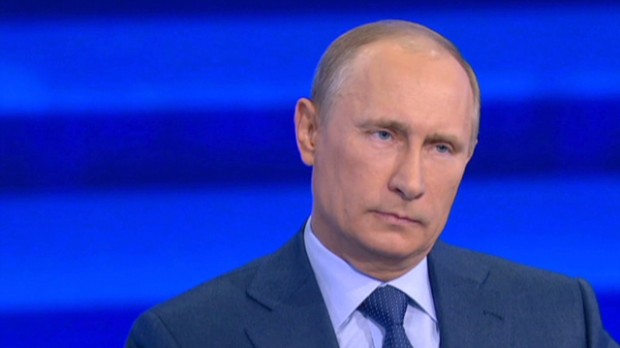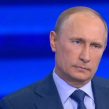
Putin in Denial About Economic Stagnation, and in a Rage About Arctic Sovereignty
Publication: Eurasia Daily Monitor Volume: 10 Issue: 178
By:

State budgets are a difficult topic of debate in all countries. And Russia, which used to pass them fairly easily, is now facing some unpleasant realities related to the 2014 budget that was presented by the government last week. For one thing, many social programs are slated for cuts, while expenditures on hard security keep rising; for instance, the share of defense spending is increasing from 15.7 to 17.8 percent (Novaya Gazeta, October 1). For another, the government has proposed using current payroll contributions to private pension savings to cover the expanding hole in the state-run Pension Fund, which amounts to a “temporary expropriation” of other people’s money (Vedomosti, October 4; Kommersant, October 2). This budget policy puts the emphasis on tactical maneuvering in order to avoid the painful revisions necessitated by the fact that the Russian economy has entered a phase of stagnation that. By the most positive accounts, this stagnation will be quite protracted though not degenerate into a recession (Nezavisimaya Gazeta, October 1).
Prime Minister Dmitry Medvedev has taken it upon himself to half-acknowledge the dead end of the economic model based on massive state investment and to proclaim the imperative for change, while suggesting a package of superficial measures (https://www.gazeta.ru/comments/2013/09/30_x_5674569.shtml). President Vladimir Putin also addressed economic matters last week, putting those in the right perspective, for instance emphasizing the assessment that Russia might soon become the largest economy in Europe (Kommersant, October 3). He admitted that there were some irregularities with executing the state budget but insisted that corruption was not the issue and the solution was strengthening discipline (https://newsru.com/finance/04oct2013/fks.html). His confidence in the commanding economic role of the state—the government’s budget now makes up 37 percent of GDP—is undiminished by the mounting evidence of the inefficiency of state control, in which every bureaucrat imitates the supreme leader, who remains a firm believer in “manual control.”
Finance Minister Anton Siluanov, meanwhile, laments in vain about the abnormal increase in the legion of state bureaucrats: 100,000 people were added in the last five years (https://newsru.com/finance/04oct2013/siluanov.html). Siluanov’s deep resentment of this self-serving super-structure—positioned against the liberal intelligentsia—was underscored by remarks from Sergei Ivanov, the chief of the presidential administration and Putin’s loyal subordinate, who accused bloggers and other “office plankton” of parasitism, since their intellectual property has no real value (https://www.forbes.ru/mneniya-column/vertikal/245691-otvet-sergeyu-ivanovu-chto-proizvodit-moskva). The real issue here is certainly the irritation and angst in the Kremlin about the uncontrollable urban middle class of Moscow, where unexpected protests filled streets and squares in early 2012, and presently the maturing discontent takes new shapes and forms.
The “material men” of Putin’s ruling elite are worried about the interplay between the economic slump and the protest activity of bloggers, who now have a dynamic leader in Alexei Navalny. Nevertheless, the Russian elite puts its collective faith in the pacifying effect of petro-revenues. The problem is that sustained abuse of the oil and gas industries by predatory courtiers, who seek to channel the money into such corruption-ridden mega projects as the Sochi Winter Olympics, about which even the ministers in Medvedev’s government speak with helpless disapproval, has resulted in under-investment in productive assets. As a result, Russia finds itself overtaken by the United States, not only in gas production due to the spectacular shale gas “revolution,” but also in oil production as new technologies revolutionize this industry in Texas and North Dakota (Nezavisimaya Gazeta, October 4). Russian energy oligarchs keep hoping for a miracle and Igor Sechin, CEO of Rosneft and Putin’s trusted lieutenant, announced that he had a dream about discovering a huge oil and gas field in the Russian Far North’s Kara Sea (Vedomosti, October 1).
Professor Sergei Medvedev, a well-known commentator in Russia’s political and cultural debates, expressed a different dream. He argued that the Soviet and then Russian track record of “conquering” the Arctic has been so destructive for the fragile environment that all economic activity in the High North should be banned and a natural preserve in this vast region should be established (https://www.forbes.ru/mneniya-column/tsennosti/245761-zapovednaya-territoriya-arktiku-nuzhno-spasti-ot-korporatsii-i-gosud). This idea, initially spelled out in a comment to a separate blog post, infuriated certain Russian politicians to such a degree that the question was brought to Putin’s attention. The president duly lashed out against the “treacherous” position, which, according to Putin, failed to take into account the threat created by US submarines patrolling along the coast of Norway, whose missiles, he said, could reach Moscow in 16–17 minutes (Novaya Gazeta, October 4).
This outburst betrays deep contradictions in Russian Arctic policy. On the one hand, it pledges a commitment to international cooperation, but on the other, it is obsessed with Russia’s sovereignty over the region. Hence, Moscow’s proclamations of the commercial attractiveness of the Northern Sea Route (or Sevmorput) blend with plans for rebuilding the military base on Kotelny Island, which was abandoned 20 years ago. Drilling for oil and gas in the Arctic seas makes little economic sense but is central to the desire to assert Russia’s sovereignty over this region, whatever the ecological risks (https://lenta.ru/articles/2013/09/30/pri/). The protest action executed by the environmental group Greenpeace against Gazprom’s Prirazlomnaya oil platform hit at the raw nerve in this obsession, so the activists are being treated with extreme prejudice (https://www.gazeta.ru/comments/2013/10/04_e_5687469.shtml). The formal charge of “piracy” is deliberately absurd (it carries the maximum sentence of 15 years in prison) and is intended to demonstrate that Russian law enforcement is willing to punish the trespassers severely, while dismissing all international protestations.
Denials of hard problems, inadequate reactions to dissent, and the propensity to resort to disproportionate violence are all characteristic symptoms of a political regime in the advanced stage of decomposition. The Kremlin cannot explain Russia’s massive capital flight or the discontent among its well-off middle classes because every attempt at serious analysis results in explanations that the narcissistic ruler and his rent-seeking court do not want to hear. The authorities may put Navalny behind bars and convict the Greenpeace activist as “pirates,” but every abuse of force and execution of injustice adds to the legitimacy crisis of the quasi-democratic and deeply corrupt system of power. Putin has to resort to spinning economic propaganda and exploiting half-baked “patriotic” myths, yet the ranks of believers in Putinism who are eager to be fooled by bombastic discourses are thinning fast. It sometimes takes just a single blog comment to shake such a system.




